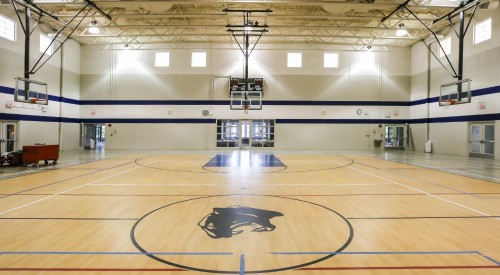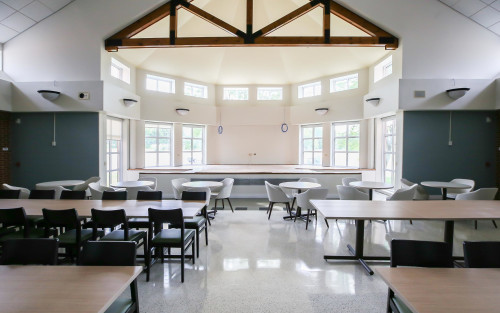








Recovery Centers of America at St. Charles
Verified Center
This provider's information has been quality-checked by Recovery.com's Research Team for accuracy and completeness, including center verification through appropriate third-party organizations.
Treatment Focus
This center treats substance use disorders and co-occurring mental health conditions. Your treatment plan addresses each condition at once with personalized, compassionate care for comprehensive healing.
Primary Level of Care
Offering intensive care with 24/7 monitoring, residential treatment is typically 30 days and can cover multiple levels of care. Length can range from 14 to 90 days typically.
Treatment Focus
This center treats substance use disorders and co-occurring mental health conditions. Your treatment plan addresses each condition at once with personalized, compassionate care for comprehensive healing.
Primary Level of Care
Offering intensive care with 24/7 monitoring, residential treatment is typically 30 days and can cover multiple levels of care. Length can range from 14 to 90 days typically.
Provider's Policy
We are in-network with many insurance providers.
Recovery Centers of America at St. Charles
Recovery Centers of America at St. Charles
About Recovery Centers of America at St. Charles
Ranked #8 in Illinois on Newsweek’s 2024 list of America’s Best Addiction Centers, RCA at St. Charles delivers clinically proven care with signature compassion. They treat substance use disorders and co-occurring mental health conditions through medically monitored detox and residential treatment. With a peaceful, expansive campus and a focus on therapeutic structure, they help clients step away from daily stress and begin building a foundation for lasting recovery.
Navigate Recovery with 6 Guiding Principles
RCA applies six core tenets they’ve determined essential for every client to achieve sustained recovery. These include medications to reduce cravings and prevent relapse, daily 12-step meetings for peer support, and dialectical behavior therapy (DBT) skills training to manage emotions and cope with challenges. Clients also benefit from family involvement, strong alumni connections after discharge, and care that’s guided by real-time progress tracking to adapt and improve treatment along the way.
Recharge in a Restorative Setting
Set on 125 scenic acres in the Chicagoland area, RCA at St. Charles offers clients a peaceful escape from the stress of everyday life. Semi-private cottages include full-size beds, individual bathrooms, and flat-screen TVs. Clients enjoy homemade meals in the cafeteria, explore the property’s outdoor areas and pond, and stay active in the state-of-the-art gym and wellness center.
Stay Supported with a Thriving Alumni Network
RCA’s alumni association helps clients stay supported and inspired long after treatment ends. They offer ongoing recovery meetings and sober events like movies, sports, and picnics to bring alumni together for fun, fellowship, and connection. Many events allow alumni to invite family and friends, so their support system can play an active role in recovery.

Highlights from the Center
Highlights
These highlights are provided by and paid for by the center.
Therapeutic Location
Perfect for Professionals
Private Rooms Available
Tech Friendly
Center Overview
Treatment Focus
This center treats substance use disorders and co-occurring mental health conditions. Your treatment plan addresses each condition at once with personalized, compassionate care for comprehensive healing.
Joint Commission Accredited
The Joint Commission accreditation is a voluntary, objective process that evaluates and accredits healthcare organizations (like treatment centers) based on performance standards designed to improve quality and safety for patients. To be accredited means the treatment center has been found to meet the Commission's standards for quality and safety in patient care.
Recovery Centers of America at St. Charles
Insurance Accepted
Cash Pay Rates
Estimated Cash Pay Rate
Center pricing can vary based on program and length of stay. Contact the center for more information. Recovery.com strives for price transparency so you can make an informed decision.




More Recovery Centers of America Locations
Recovery.com Verified Listing
Recovery.com verified that the name, location, contact information and license to operate for this treatment provider are valid and up-to-date.

ASAM Level 3.5 and 3.7 Certified

Joint Commission Accredited

Licensed by Illinois
Recovery.com is an independent, third-party mental health resource. Verification does not imply endorsement and does not guarantee the quality of treatment services.
Your Care Options
Specializations
Detox
Detox fully and safely removes toxic substances from the body, allowing the next steps in treatment to begin with a clean slate.
Co-Occurring Disorders
A person with multiple mental health diagnoses, such as addiction and depression, has co-occurring disorders also called dual diagnosis.
Executives
Executive treatment programs typically directly support the needs of people who manage businesses and may provide flexible schedules and office space to allow work during treatment.
Flexible technology policies
Centers with flexible technology policies allow professionals to stay in touch with work and give patients a greater sense of connection and normalcy.
Professionals
Busy, high-ranking professionals get the personalized treatment they need with greater accommodations for work, privacy, and outside communication.
Residential
In a residential rehab program, patients live onsite, with access to daily treatment and 24-hour care. An average stay is 30-90 days.
Who We Treat
Executives
Executive treatment programs typically directly support the needs of people who manage businesses and may provide flexible schedules and office space to allow work during treatment.
Professionals
Busy, high-ranking professionals get the personalized treatment they need with greater accommodations for work, privacy, and outside communication.
Treatment Services
Detox
Detox fully and safely removes toxic substances from the body, allowing the next steps in treatment to begin with a clean slate.
Residential
In a residential rehab program, patients live onsite, with access to daily treatment and 24-hour care. An average stay is 30-90 days.
Approaches
Evidence-Based
A combination of scientifically rooted therapies and treatments make up evidence-based care, defined by their measured and proven results.
Family Involvement
Providers involve family in the treatment of their loved one through family therapy, visits, or both–because addiction is a family disease.
Holistic
A non-medicinal, wellness-focused approach that aims to align the mind, body, and spirit for deep and lasting healing.
Individual Treatment
Individual care meets the needs of each patient, using personalized treatment to provide them the most relevant care and greatest chance of success.
Therapies
Art Therapy
Visual art invites patients to examine the emotions within their work, focusing on the process of creativity and its gentle therapeutic power.
Family Therapy
Family therapy addresses group dynamics within a family system, with a focus on improving communication and interrupting unhealthy relationship patterns.
Medication-Assisted Treatment
Combined with behavioral therapy, prescribed medications can enhance treatment by relieving withdrawal symptoms and focus patients on their recovery.
Motivational Interviewing and Enhancement Therapy (MET)
This approach is based on idea that motivation to change comes from within. Providers use a conversational framework that may help you commit to recovery.
Music Therapy
Singing, performing, and even listening to music can be therapeutic. Music therapy sessions are facilitated by certified counselors.
Relapse Prevention Counseling
Relapse prevention counselors teach patients to recognize the signs of relapse and reduce their risk.
Twelve Step Facilitation
12-Step groups offer a framework for addiction recovery. Members commit to a higher power, recognize their issues, and support each other in the healing process.
Conditions We Treat
Anxiety
Anxiety is a common mental health condition that can include excessive worry, panic attacks, physical tension, and increased blood pressure.
Codependency
Codependency is a pattern of emotional dependence and controlling behavior. It's most common among people with addicted loved ones.
Depression
Symptoms of depression may include fatigue, a sense of numbness, and loss of interest in activities. This condition can range from mild to severe.
Post Traumatic Stress Disorder
PTSD is a long-term mental health issue caused by a disturbing event or events. Symptoms include anxiety, dissociation, flashbacks, and intrusive thoughts.
Stress
Stress is a natural reaction to challenges, and it can even help you adapt. However, chronic stress can cause physical and mental health issues.
Trauma
Some traumatic events are so disturbing that they cause long-term mental health problems. Those ongoing issues can also be referred to as "trauma."
Substances We Treat
Alcohol
Using alcohol as a coping mechanism, or drinking excessively throughout the week, signals an alcohol use disorder.
Co-Occurring Disorders
A person with multiple mental health diagnoses, such as addiction and depression, has co-occurring disorders also called dual diagnosis.
Drug Addiction
Drug addiction is the excessive and repetitive use of substances, despite harmful consequences to a person's life, health, and relationships.
Languages
Aftercare
Care Designed for Your Needs
Personal Amenities
Amenities
Special Considerations
Flexible technology policies
Centers with flexible technology policies allow professionals to stay in touch with work and give patients a greater sense of connection and normalcy.
Activities
Learn More About the Center
Alumni Stories
Discover how real clients found strength, healing, and hope through treatment at RCA.
Debunking Detox Fears with Alumni Experiences
Hear firsthand how others overcame anxiety and made it through the detox process successfully.
Breaking Generational Addiction Family Patterns
Learn how to stop inherited cycles of addiction and become a force for lasting change.
Thriving in Sobriety: 7 Tips to Cure Boredom in Recovery
Explore simple ways to stay engaged, energized, and fulfilled without substances.
What people are saying
Treatment
4.0
Accommodations
4.5
Food & Nutrition
4.3
Value
4.3
Pros
- Beautiful Location (2)
- Luxurious Accommodations (2)
- Excellent & Effective Treatment Programming (2)
- Friendly & Competent Staff (2)
Shannon
Reviewed 12/20/24
Review from Rehabs.com
Shayne
Reviewed 06/02/25
Review from Rehabs.com
Julie K
Treatment in 2023 • (30 days) • Reviewed 08/17/23
Former Client
Penelope H
Treatment in 2023 • (30 days) • Reviewed 10/14/23
Former Client
•Caretaker





